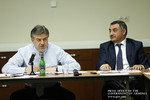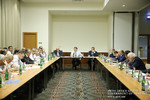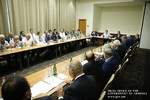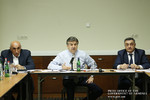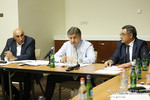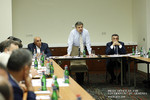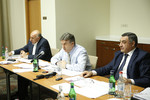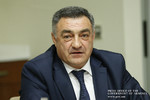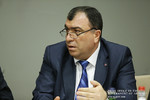Saturday, 29 July 2017
PM-chaired meeting reviews ongoing activities and future plans in Vayots-Dzor Marz
On July 28, Prime Minister Karen Karapetyan left Syunik Marz for Vayots-Dzor Marz of Armenia to discuss ongoing activities and community development programs during a consultation held in Jermuk.
Presenting the socioeconomic situation and the main economic indicators in Vayots-Dzor Marz, Governor Harutyun Sargsyan noted that the region boasts a 1.2% share in the country’s GDP.
Industrial enterprises in Vayots-Dzor Marz annually produce 15-16 billion drams of gross output, with the processing industry being a dominant vector (production of mineral waters and beverages). Agriculture spearheads economic development in the region, with an annual output of 20-22 billion drams.
The total area of grape and fruit orchards has increased by 248 hectares over the past few years, of which 31.5 ha is irrigated through the drip system, with opportunities available to increase the area of fruit orchards to 150-200 ha. 47.2 hectares of fruit orchards have been established in Armin, Khndzorut, Azatek and Vernashen communities under the Armenian Fruit Program.
Earlier this year, 5169 hectares were planted with agricultural crops in the region. The Marz has almost completely switched over to gravity irrigation. Through the Office for the Economic Development of Rural Territories, a 23-kilometer-long internal irrigation network has been built with a total cost of 720 million drams.
According to the Governor, the development of agriculture calls for the promotion of agricultural cooperatives, farms and intensive gardens. As instructed by the Prime Minister, 20 investment projects worth AMD 2,384 million were submitted to the Ministry of Territorial Administration and Development of the Republic of Armenia. The Government approved 8 programs worth over 1,616 million drams, 2 of which have to do with the production of dried fruit and cheese made from goat’s milk: 120 million drams have already been spent to this end.
A marz development strategy for 2017-2025 is already out, which stipulates the following priority areas: agriculture, tourism, production modernization. Mining and energy are also areas of potential development in the region. The Amulsar gold mine project is of great importance in terms of addressing the problem of employment. USD 370 million will be invested in 2017-2018 to generate 1,300 jobs. 730 people are currently working at the mine, 350 of which are residents of the region.
Tourism is one of the most dynamically developing sectors in Vayots-Dzor Marz. 42 thousand tourists visited the region in 2016; this figure reached the mark of 20,400 in the first half of 2017.
An amount equivalent of USD 10 million is due to be invested in Jermuk. 40 million drams have been allocated from the State budget for design work. The communities’ own revenues stand at 701 million drams. Revenue was collected to 101.7% in the first 6 months of 2017, which is a 16% growth as compared to the same period last year.As a result of the enlargement of 18 communities in Vayots-Dzor Marz, the enlarged communities of Vayk, Jermuk, Zaritap were formed in 2016. 24 other communities will be consolidated in 2017. In response to the question of the Prime Minister, it was noted that in the first half of this year Vayots-Dzor has already implemented investment programs for 1 billion 230 million drams and 117 million dollars, as a result created about 600 new jobs.
The region was said to have joined the nationwide clean-up campaign of May 27, held as part of the Clean Armenia program. As a result, 112 of 129 dumps were shut down. Calculations have been made for complete elimination of 4 dumps. Work is in progress towards the closure of 6 out of 13 landfills.
Karen Karapetyan pointed to the importance of private sector’s involvement in the provision of various services, including garbage collection, noting that this would lead to a qualitative change.
Touching upon the Clean Armenia program, the Head of Government stressed, “I noticed that some people were engaged in garbage disposal on inter-community roads, and this is very gratifying. If we continue like this, we will see big changes in six months or next year.”
The regional administration’s officers responsible for agriculture, healthcare, education, small and medium-sized business and tourism reported back the work done and carried out in these areas. The Prime Minister touched upon the state-supported programs in the field of agriculture, emphasizing the benefits of the proposed conditions and highlighting the need for proper awareness raising efforts concerning these programs. The supervisor of education and healthcare reported that work is underway in the direction of optimization, as a result of which 56 million drams were saved up in the sphere of education, with 24 million drams spared in the sphere of public health. The program will be permanent.
“We have a fairly large potential for effective spending. Our number one task is not to save money, but to give our children the opportunity to get a modern and high-quality education. If we want to have a powerful statehood, we must give our children a better education. And at this time, we simply need to spend money effectively, taking into account our capabilities. I think that we have many places where we can optimize,” the Prime Minister said.
It was reported that successful video lessons have been held in the schools of the region. Cooperation is underway with AYB School after Mkhitar Heratsi and the Physics and Mathematics School in Yerevan.
Touching upon the healthcare sphere, Karen Karapetyan expressed dissatisfaction with the indicators of financial resources collected for the provision of paid services and the work carried out in this direction. The Premier told the Governor to take appropriate steps to this end.
In conclusion, the meeting discussed the ongoing private investment programs and the planned activities in the spheres of urban development and road construction.







